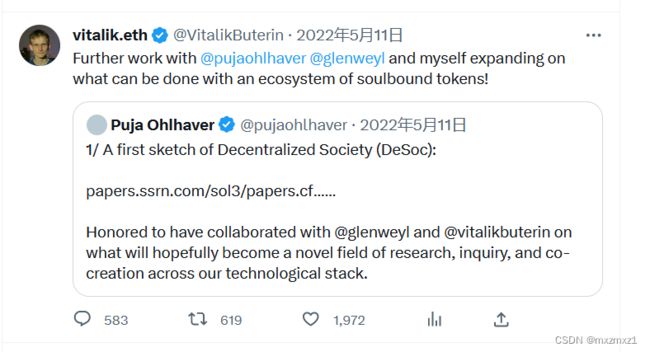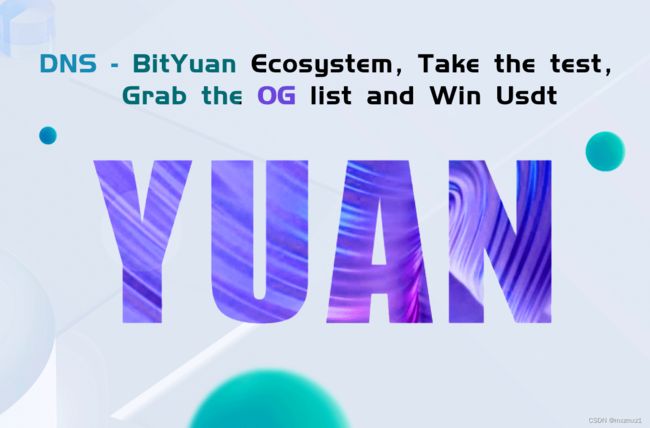BTY Ecosystem DNS‘s Ideas of DeSoc
In May 2022, Ethereum founder Vitalik Buterin, economist Glen Weyl and Flashbots researcher Puja Ohlhaver jointly released “Decentralized Society: Finding Web3's Soul”. The core idea of this paper is the possibility of creating a decentralized society around the “Web3 Soul”.
The paper stated that the current Web3 is more about expressing transferable and financial assets, rather than encoding social trust relationships. Yet many core economic activities, such as unsecured loans and building a personal brand, are built on lasting, non-transferable relationships. This “more transformative, more diverse future of increasing rewards across community distances” requires a better encoding of social relationships in Web3 by relying on Soulbound Tokens (SBTs) held by “Soul”.
1. Basic Elements
Account: The account system in Web2 is composed of email address and mobile phone number, while the account in Web3 is a wallet or an address, which holds a variety of tokens. We refer to the account as the “Soul”.
Traceability Relationship Certificate: non-transferable Soulbound token SBT, SBT will encode the social relationship network by tracking Soul's “commitment, certificate and affiliation” on the chain.
2. Possible DeSoc Use Cases
Art & Soul: Artists can use their souls to issue NFTs. By doing so, they can “stake their reputation on the work” in a direct, on-chain way. Artists can also create their own SBTs for different purposes, such as linking their NFTs to on-chain collectibles to emphasize provenance. Thus, SBTs and the social networks they portray can help prevent plagiarism, deep fakes, and so on.
“Soul” Lending: The traditional financial ecosystem supports many forms of unsecured lending, but relies on centralized credit scores to measure borrowers' creditworthiness, with little incentive for borrowers to share information about their credit history. However, this kind of credit score is controlled by a centralized organization, which has the disadvantage of manipulating your personal social credit. In the decentralized society DeSoc, an ecosystem of SBTs can create an open, fair, just, censorship-resistant, bottom-up alternative to the top-down commercial “social” credit system. SBTs representing educational credentials, work experiences, and lease contracts can be durably recorded as credit-related histories, allowing “Soul” to pledge a good reputation to avoid collateral requirements and get a loan. The ease with which SBTs can be used to calculate public debt will open up the lending markets. New correlations between SBTs and repayment risk would emerge, leading to better lending algorithms for predicting creditworthiness and reducing reliance on centralized, opaque credit scoring agencies. As the paper's authors wrote: “Loans and credit lines can be represented as non-transferable but revocable SBTs, so they are nested within other SBTs of a Soul.” “Until they are repaid and subsequently destroyed, or better, replaced by proof of repayment.”
Get your “Soul” back: In Web3, if you lose your mnemonic phrase and private key, you will lose the assets in your wallet, which also means you have lost your “soul” in DeSoc. Today, account recovery methods such as social recovery wallets like Argent that allow you to rely on trust relationships (such as guardians) are our current best option for the long-term storage of Ethereum accounts. Over time, however, maintaining a close-knit group of guardians can be tedious, so “community recovery” through SBT may be a better option.
Souldrops: At present, Web3 relies heavily on token sales or airdrops to convene new communities, and this approach is not very accurate and precise. Airdrop, that is, free giving a set of wallet addresses, mostly falling into some combination of existing token holders and wallets, is vulnerable to Sybil attacks. SBTs have a radical improvement on this, which we call souldrops. Why do you say that? Because SBT can track the community you are in, if you need to restore your soul, then SBT can be used to “maximize the use of a wide range of real-time relationships for safety”, rather than relying on only a few guardians. Although some implementation mechanisms are still to be improved, but the concept is workable.
“Soul” DAO Governance: DAO centered on community governance face the threat of Sybil attacks, where users have multiple wallets to increase their voting power. SBT will distinguish it as a “soul and a possible robot” by tracing and calculating the social network relationship of its “soul”, so as to defend against Sybil attacks.
Flexible Assets: In the traditional social system, we use ID cards to query or trade various assets under our name, such as legal currency, stocks, real estate, cars, insurance, etc. We complete the transfer of assets, flexible transactions of property rights and so on through third-party agencies and contracts. In Web3, we use the wallet address to query and trade the assets you hold. However, the current Web3 transactions all grant the owner the right to use, destroy or profit from the asset at one time. It is difficult to separate property rights for extended transactions. For example, using an apartment according to the lease, but this apartment isn’t yours, and you can't destroy it either. In the future DeSoc, we can use SBT to break down the ability of property rights, because we can trace the social network economic relationship according to the SBT held in the “soul”, thereby expanding the flexibility of this subtle physical and virtual asset property rights.
The above is Vitalik's future vision of the decentralized society DeSoc. So, how does this relate to our BTY ecosystem DNS?
3. BTY ecosystem DNS is committed to creating a decentralized identity (DID) in the Web3 field. Decentralized identity (DID) returns digital identity ownership, control and management rights to users. The core is to create a unique identity certificate on the chain. With the rise of diversified application scenarios such as DeFI, NFT, and DAO, DID has become the “soul” of building a DeSoc.
According to the use cases described in “Decentralized Society: Finding Web3's Soul”, the following key technologies are required to implement DeSoc. For example, flexible assets: BTY is compatible with the EVM. In the traditional financial system, a bank account can receive multiple legal currencies, such as U.S. dollars, British pounds, Japanese currency, RMB, etc., and BTY is compatible with the EVM. Users only need to use the same wallet address to receive the assets of EVM chains such as Ethereum, OP, ARB, BitYuan, etc., which is the first step to realize flexible assets. Furthermore, BTY has realized zero-knowledge proof technology, in the transaction of flexible assets, the address needs to be public but the asset privacy and security transactions are required. Zero-knowledge proof technology allows the asset in the domain names you hold to achieve this goal. In DeSoc, how to get back your “soul”? The smart account function implemented by BTY has been applied in the wallet recovery. Through the wallet recovery function, we can quickly and flexibly retrieve your lost “soul”.
BTY ecosystem DNS is developed according to “Decentralized Society: Finding Web3's Soul”. In the DNS roadmap of the BTY ecosystem, in the future, users can bind domain name and address to create DeSoc’s soul ID, and display the NFT images held in the address as domain name, showing your image and soul in DeSoc. Through cross-network docking, on-chain relationship proof and traceability are realized, thereby constructing a new generation of social and economic system of DeSoc.
As Vitalik said, the wider world in the future is a decentralized DeSoc. In this society, DID will become a personal unique identifier, which will not only be used in the Web 3.0 network world, but will have a wider use space. The DNS decentralized domain name system has opened .yuan registration. Users can go to dns.bityuan.com to register and create YUAN ID in the DeSoc.